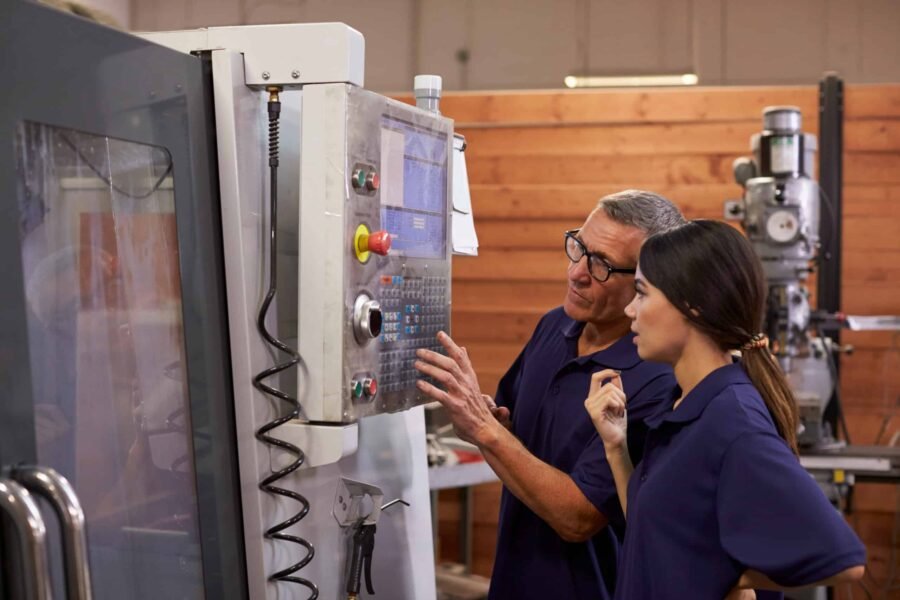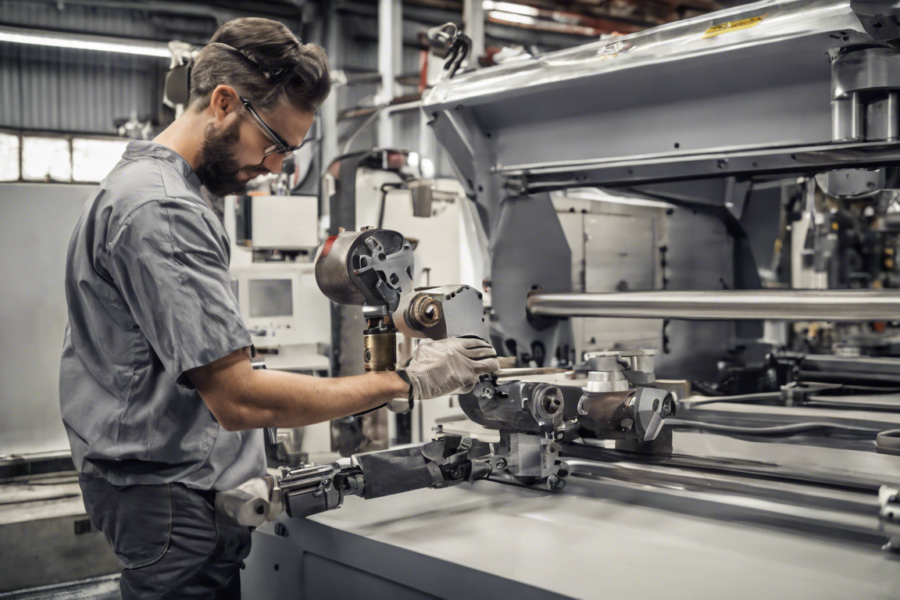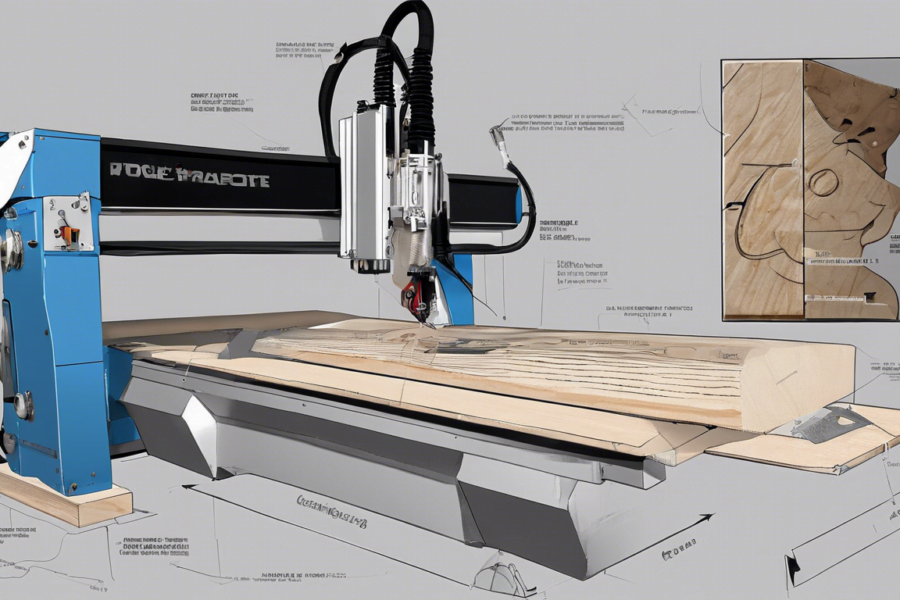Job Descriptions and Requirements for CNC Machinist Positions
When it comes to hiring CNC machinists, it is important for employers to have a clear understanding of the necessary skills, qualifications, and experience required for the role. Similarly, job seekers who are interested in pursuing a career as a CNC machinist can benefit from understanding what the role entails and what employers are looking for. In this section, we will provide detailed job descriptions for CNC machinist positions, including the skills, qualifications, and experience needed.
A CNC machinist is responsible for operating computer numerical control (CNC) machines to produce precision metal parts and components. They work with a variety of materials, such as metal, plastic, and wood, and use specialized tools and equipment to shape and cut these materials according to specific blueprints and instructions. CNC machinists play a crucial role in the manufacturing industry, as they ensure that the final products meet the required specifications and quality standards.
To excel in this role, CNC machinists need to possess a strong technical aptitude and a solid understanding of CNC programming and machine operations. They must be able to interpret technical drawings and blueprints, as well as have a good grasp of mathematics and measurements. Attention to detail is paramount, as CNC machinists need to meticulously follow instructions and accurately measure and inspect finished parts to ensure they meet the required specifications.
In addition to technical skills, CNC machinists should also have good problem-solving abilities and be able to troubleshoot and resolve any issues that may arise during the machining process. They should be familiar with different types of CNC machines and be able to set up and calibrate them for optimal performance. Knowledge of various cutting tools, speeds, and feeds is also essential, as CNC machinists need to select the appropriate tools and settings to achieve the desired results.
Furthermore, CNC machinists must have a strong commitment to safety protocols and be able to operate machines in a safe and responsible manner. They should be knowledgeable about the potential hazards associated with machining operations and take necessary precautions to prevent accidents and injuries. Additionally, CNC machinists should be able to maintain and clean their machines regularly to ensure their longevity and optimal performance.
As for the qualifications and experience required, most employers prefer candidates with a high school diploma or equivalent. Vocational or technical training in machining or CNC programming is highly desirable, as it provides candidates with the necessary knowledge and practical skills. Some employers may also require certification in CNC machining or a related field, which can be obtained through professional organizations or trade schools.
Experience is also an important factor in the hiring process. While some entry-level positions may be available for candidates with limited experience, most employers prefer candidates with at least a few years of hands-on experience in CNC machining. This experience can be gained through internships, apprenticeships, or previous employment in a similar role. Having a strong portfolio or references from previous employers can also greatly enhance a candidate’s chances of securing a CNC machinist position.
In conclusion, CNC machinists play a vital role in the manufacturing industry, operating CNC machines to produce precision metal parts and components. To be successful in this role, CNC machinists need to possess strong technical skills, problem-solving abilities, and a commitment to safety. They should have a solid understanding of CNC programming and machine operations, as well as the ability to interpret technical drawings and blueprints. Additionally, employers typically look for candidates with a high school diploma, vocational training in machining, and hands-on experience in CNC machining. By understanding the job requirements and acquiring the necessary skills and qualifications, job seekers can position themselves for success in the field of CNC machining.
One of the first steps in becoming a CNC machinist is to gain the necessary education and training. Many community colleges and technical schools offer programs specifically designed for aspiring CNC machinists. These programs typically include coursework in blueprint reading, computer-aided design (CAD), computer numerical control (CNC) programming, and machining techniques. Students also have the opportunity to gain hands-on experience using CNC machines in a lab setting.
After completing their education, individuals can begin their careers as entry-level CNC machinists. These positions often involve operating CNC machines, monitoring their performance, and making adjustments as needed. Entry-level machinists may also be responsible for performing routine maintenance on the machines and inspecting the quality of the finished products. This initial experience allows individuals to become familiar with the various types of CNC machines and develop their skills in operating and troubleshooting them.
As CNC machinists gain more experience and expertise, they may choose to pursue certifications to enhance their career prospects. One widely recognized certification is the National Institute for Metalworking Skills (NIMS) certification. This certification validates the machinist’s skills in areas such as CNC milling, CNC turning, and CNC programming. Having a NIMS certification can demonstrate to employers that an individual has the necessary knowledge and skills to excel in the field.
In addition to certifications, CNC machinists can also explore opportunities for specialization within the field. For example, some machinists may choose to focus on programming CNC machines. This involves writing the code that controls the machine’s movements and operations. Programming CNC machines requires a deep understanding of CAD/CAM software and the ability to interpret complex blueprints. Machinists who specialize in programming often have higher earning potential and may be sought after by companies looking to optimize their manufacturing processes.
Another area of specialization within CNC machining is operating specific types of machines, such as lathes or mills. Each type of machine has its own unique set of operations and requires specific knowledge and skills to operate effectively. Machinists who become experts in operating a particular type of machine can become valuable assets to companies that rely heavily on that type of machining process.
As CNC machinists gain experience and demonstrate their skills, they may have opportunities for advancement within their careers. This can include roles such as lead machinist, where they oversee a team of machinists and coordinate production schedules. Advancement can also lead to positions in management or engineering, where machinists can apply their knowledge and experience to improve manufacturing processes or develop new products.
In conclusion, a career as a CNC machinist offers a variety of paths for individuals to explore. From entry-level positions to certifications and specialization, there are many opportunities for growth and advancement in this field. By gaining the necessary education and training, developing their skills, and staying current with industry trends, CNC machinists can build rewarding and fulfilling careers in the manufacturing industry.
Salary Guides for CNC Machinist Positions
Understanding the salary ranges for CNC machinist positions can be valuable for both employers and job seekers. Factors such as location, experience, and industry can influence the compensation offered for these roles. Employers can use this information to set competitive compensation packages, while job seekers can use it to negotiate salaries. In this section, we will provide insights into the salary ranges for CNC machinist positions.
When it comes to determining the salary range for CNC machinist positions, several factors need to be taken into consideration. One of the primary factors is the geographical location of the job. Salaries for CNC machinists can vary significantly depending on the region. For example, a CNC machinist working in a rural area may earn a lower salary compared to someone working in a metropolitan city where the cost of living is higher.
Another crucial factor that influences the salary range is the level of experience. Entry-level CNC machinists with limited experience may start at a lower salary compared to those with several years of experience in the field. As machinists gain more experience and develop their skills, they become more valuable to employers, which often leads to higher salaries.
The industry in which the CNC machinist works also plays a role in determining the salary range. Different industries have different demands for CNC machinists, and this can impact compensation. For example, a CNC machinist working in the aerospace industry may earn a higher salary compared to someone working in the automotive industry. This difference is due to the complexity and precision required in aerospace manufacturing.
Furthermore, the specific job responsibilities and the level of expertise required can affect the salary range. CNC machinists who specialize in operating advanced machinery or programming complex computer numerical control systems may command higher salaries due to their specialized skills.
It’s important to note that these salary ranges are not set in stone and can vary depending on various factors. Employers should consider conducting market research to determine the average salary range for CNC machinist positions in their specific location and industry. This will help them attract and retain top talent by offering competitive compensation packages.
Job seekers, on the other hand, can use this information to their advantage during salary negotiations. By understanding the average salary range for CNC machinist positions, they can confidently negotiate for fair compensation based on their skills, experience, and the demands of the job.
In conclusion, understanding the salary ranges for CNC machinist positions is essential for both employers and job seekers. Employers can use this information to ensure they are offering competitive compensation packages, while job seekers can use it to negotiate salaries that reflect their skills and experience. By considering factors such as location, experience, industry, and job responsibilities, both parties can arrive at a mutually beneficial agreement.
Training and Certification Programs for CNC Machinists
Individuals who are interested in becoming CNC machinists or advancing their skills in the field can benefit from various training programs, courses, and certifications. These programs can be offered both online and in-person, and there are resources available to help individuals prepare for certification exams. In this section, we will highlight the different training and certification programs available for individuals interested in CNC machining.
One popular training program for CNC machinists is the National Institute for Metalworking Skills (NIMS) certification. NIMS offers a range of certifications that cover different aspects of CNC machining, including programming, setup, and operation. These certifications are recognized by employers in the industry and can greatly enhance a machinist’s job prospects.
Another option for aspiring CNC machinists is to enroll in a vocational school or community college program. These programs typically offer hands-on training in a workshop setting, allowing students to gain practical experience operating CNC machines. In addition to technical skills, these programs often include coursework in blueprint reading, mathematics, and computer-aided design (CAD).
For those who prefer a more flexible learning approach, online training programs are also available. These programs allow individuals to learn at their own pace and from the comfort of their own homes. Online courses often include video tutorials, interactive simulations, and virtual labs to provide a comprehensive learning experience. Some online training programs also offer certification exams, allowing individuals to earn a recognized credential in CNC machining.
In addition to formal training programs, there are also resources available to help individuals prepare for certification exams. These resources can include study guides, practice exams, and online forums where individuals can ask questions and get support from experienced machinists. By utilizing these resources, individuals can ensure they are well-prepared for their certification exams and increase their chances of success.
Overall, there are numerous training and certification programs available for individuals interested in pursuing a career in CNC machining. Whether through formal education programs, online training courses, or self-study resources, individuals can acquire the skills and knowledge needed to excel in this field. By obtaining certifications and staying up-to-date with the latest advancements in CNC machining technology, machinists can position themselves for success and open doors to exciting career opportunities.
Industry Trends and Technologies in CNC Machining
The field of CNC machining is constantly evolving, with new trends, technologies, and innovations emerging. It is important for both employers and job seekers to stay updated on these advancements to remain competitive in the industry. This section will explore the latest trends in CNC machining, including advancements in machine automation, software development, and additive manufacturing techniques.
Machine Automation
One of the most significant trends in CNC machining is the increasing level of machine automation. As technology continues to advance, machines are becoming more intelligent and capable of performing complex tasks with minimal human intervention. This automation not only improves efficiency and productivity but also reduces the risk of human error. Advanced CNC machines are equipped with sensors and artificial intelligence algorithms that enable them to monitor and adjust parameters in real-time, ensuring optimal performance and accuracy. Additionally, the integration of robotics and automation systems into CNC machining processes allows for seamless material handling and tool changing, further enhancing productivity.
Software Development
Another key trend in CNC machining is the continuous development of software solutions that enhance machine capabilities and streamline operations. CAD/CAM software, for example, plays a crucial role in the programming and simulation of CNC machines. It enables engineers and designers to create 3D models, generate toolpaths, and simulate machining operations before the physical production begins. This not only saves time and resources but also minimizes the risk of errors and ensures the optimal use of machine capabilities. Furthermore, the integration of cloud-based software solutions and data analytics tools allows for real-time monitoring and analysis of machining processes, enabling manufacturers to make data-driven decisions and optimize their operations.
Additive Manufacturing Techniques
While subtractive manufacturing has been the traditional method in CNC machining, additive manufacturing techniques are gaining popularity in the industry. Additive manufacturing, also known as 3D printing, involves building objects layer by layer using digital models. This technique offers numerous advantages, including the ability to create complex geometries, reduce material waste, and produce customized parts with shorter lead times. In CNC machining, additive manufacturing techniques are often used for prototyping, tooling, and low-volume production. The integration of additive manufacturing with CNC machining processes allows manufacturers to leverage the benefits of both technologies and achieve higher levels of efficiency and flexibility.
In conclusion, the field of CNC machining is experiencing rapid advancements in machine automation, software development, and additive manufacturing techniques. Staying updated on these trends and technologies is crucial for manufacturers and job seekers alike to remain competitive in the industry. By embracing these advancements, manufacturers can improve productivity, reduce costs, and deliver high-quality products to meet the ever-increasing demands of the market.
Tips for Job Seekers Pursuing CNC Machinist Positions
In a competitive job market, job seekers pursuing CNC machinist positions can benefit from practical advice and tips to help them stand out. This can include resume writing tips, interview preparation strategies, and networking advice. In this section, we will offer practical guidance for job seekers pursuing CNC machinist positions.
1. Craft a targeted resume: When applying for a CNC machinist position, it is crucial to tailor your resume to highlight relevant skills and experience. Include a clear objective statement that demonstrates your interest in the field and showcases your expertise. Additionally, emphasize any certifications or specialized training you have received.
2. Showcase technical skills: CNC machinists require a strong understanding of technical concepts and machinery. Highlight your proficiency in operating CNC machines, reading blueprints, and programming software. Be sure to provide specific examples of projects you have completed or problems you have solved.
3. Demonstrate problem-solving abilities: CNC machinists often encounter complex challenges that require analytical thinking and problem-solving skills. Include examples of how you have successfully troubleshooted issues or implemented innovative solutions in your previous roles. Employers value candidates who can think critically and adapt to changing circumstances.
4. Prepare for technical interviews: CNC machinist positions often involve technical interviews to assess candidates’ knowledge and skills. Familiarize yourself with common interview questions in the field and practice your responses. Be prepared to discuss your experience with different machining techniques, your understanding of safety protocols, and your ability to interpret technical drawings.
5. Network within the industry: Building connections with professionals in the CNC machining industry can provide valuable insights and job opportunities. Attend industry events, join online forums or social media groups, and reach out to professionals for informational interviews. Networking can help you stay updated on industry trends, learn about job openings, and potentially secure recommendations.
6. Continuously improve your skills: The field of CNC machining is constantly evolving, with new technologies and techniques emerging regularly. Stay updated on industry advancements by attending workshops, taking courses, or pursuing additional certifications. Demonstrating a commitment to ongoing learning and professional development will make you a more attractive candidate.
By following these tips, job seekers pursuing CNC machinist positions can enhance their chances of securing a job in this competitive field. Remember to always customize your approach to each job application and showcase your unique skills and experiences.
One such inspiring case study is that of John Smith, a CNC machinist with over 20 years of experience in the industry. John started his career as an apprentice in a small machine shop, where he learned the basics of CNC machining. Over the years, he honed his skills and gained expertise in operating various CNC machines.
John’s dedication and passion for his work did not go unnoticed, and he was soon promoted to a senior machinist position. In this role, he was responsible for training new employees and troubleshooting complex machining issues. John’s ability to think on his feet and find innovative solutions to problems earned him the respect of his colleagues and supervisors.
One of John’s most significant achievements was his contribution to the development of a new machining process that significantly improved efficiency and reduced production costs. His innovative approach involved modifying the programming code of the CNC machines to optimize tool paths and reduce material waste. This breakthrough not only saved the company thousands of dollars but also earned John recognition within the industry.
Another success story is that of Sarah Johnson, a CNC machinist who started her career as a machine operator in a large manufacturing company. Sarah was determined to advance in her career and took every opportunity to learn new skills and technologies. She attended workshops and training programs to enhance her knowledge of CNC programming and CAD/CAM software.
Through her hard work and perseverance, Sarah became proficient in programming complex parts and operating multi-axis CNC machines. Her attention to detail and precision in her work earned her a reputation for producing high-quality components. Sarah’s commitment to excellence led to her promotion as a lead machinist, where she now oversees a team of CNC operators.
These case studies and success stories highlight the exciting and rewarding career opportunities available to CNC machinists. They demonstrate that with dedication, continuous learning, and a passion for the craft, individuals can achieve remarkable success in this field.
Safety Protocols and Best Practices in CNC Machining
Ensuring the safety of CNC machinists is of utmost importance in the workplace. This section will emphasize the importance of safety protocols and best practices in CNC machining, including proper equipment operation, maintenance procedures, and hazard awareness. By promoting a culture of safety, employers can create a safe and productive work environment for CNC machinists.
One of the fundamental aspects of safety in CNC machining is proper equipment operation. CNC machines are complex and powerful tools that require careful handling. Machinists should receive thorough training on how to operate the machines correctly, including understanding the different controls, programming codes, and safety features. It is essential to follow the manufacturer’s guidelines and instructions to prevent accidents and ensure optimal performance.
In addition to proper equipment operation, regular maintenance procedures are crucial for maintaining a safe working environment. CNC machines should be regularly inspected and serviced to identify and address any potential issues. This includes checking for loose bolts, worn-out parts, and ensuring proper lubrication. By conducting routine maintenance, employers can prevent unexpected breakdowns and reduce the risk of accidents caused by equipment malfunctions.
Furthermore, hazard awareness is a critical aspect of safety in CNC machining. Machinists should be trained to identify potential hazards in their work environment, such as loose clothing, long hair, or jewelry that can get caught in the machine. They should also be aware of the proper use of personal protective equipment (PPE), including safety glasses, gloves, and hearing protection. By being proactive in hazard identification and prevention, machinists can avoid accidents and injuries.
Creating a culture of safety is not only the responsibility of the machinists but also the employers. Employers should provide ongoing safety training and education to their employees, ensuring that they are up-to-date with the latest safety practices and regulations. Regular safety meetings and discussions can also be conducted to address any concerns or questions that the machinists may have. By fostering a safe work environment, employers can demonstrate their commitment to the well-being of their employees.
In conclusion, safety protocols and best practices in CNC machining Jobs are essential for the well-being of machinists and the overall productivity of the workplace. By emphasizing proper equipment operation, regular maintenance procedures, and hazard awareness, employers can create a safe working environment that promotes productivity and reduces the risk of accidents. It is crucial for both machinists and employers to prioritize safety and work together to ensure a safe and productive CNC machining environment.
Effective communication is a crucial soft skill for CNC machinists Jobs. They need to be able to clearly understand instructions from supervisors and communicate any issues or concerns that may arise during the machining process. Additionally, CNC machinists often work as part of a team, so being able to effectively communicate with colleagues is essential for ensuring smooth workflow and preventing errors.
Problem-solving is another vital soft skill for CNC machinists. They encounter various challenges on a daily basis, such as machine malfunctions, tool wear, or programming errors. The ability to analyze the problem, identify potential solutions, and implement the most effective one is crucial for minimizing downtime and maintaining productivity.
Teamwork is also a critical soft skill for CNC machinists Jobs. They often work in collaboration with other machinists, engineers, and quality control personnel to ensure the accuracy and precision of the final product. Being able to work well with others, share knowledge and expertise, and contribute to a positive team dynamic is essential for achieving optimal results.
While some individuals may naturally possess these soft skills, others may need to actively work on developing and strengthening them. One way to enhance communication skills is by actively listening to others, asking clarifying questions, and practicing clear and concise verbal and written communication. Taking part in team-based projects or joining professional organizations related to CNC machining can help improve teamwork skills by providing opportunities to collaborate with others and learn from their experiences.
Problem-solving skills can be developed by actively seeking out challenging machining tasks, analyzing the root causes of any issues that arise, and brainstorming potential solutions. Additionally, staying updated with the latest advancements in CNC technology and attending workshops or training programs can help CNC machinists develop a broader range of problem-solving techniques.
Overall, the development of soft skills is just as important as technical skills for CNC machinists. By continuously working on improving communication, problem-solving, and teamwork abilities, CNC machinists can enhance their overall effectiveness and become valuable assets in their respective industries.







Leave a Comment